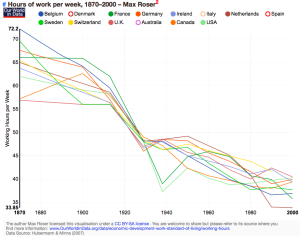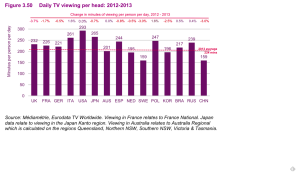Henry Blodget recently pointed out that people in the developed world have, over the past 150 years, managed to achieve a reduction in working time thanks to a variety of technological advancements. In short, whilst the normal time constraints (i.e. hours per day) have remained constant (unsurprisingly), people now manage to work 30 hours a week less on average.
So how has this mass of humanity responded to being granted such potential in the form of more free time for all? How have we combined our knowledge and ingenuity to utilise all of these technological developments?
We, er, watch more TV.


Recent figures show that the average human spends about 28 hours a week (4 hours a day) watching television.
An unpopular time of the year to be railing against the box in the corner of the room perhaps. But – really?
It’s always seemed to me that some technology encourages passive consumption and some technology accelerates active creation. In many ways, the creative output is of far less importance than the fact that the process itself is taking place. Whilst life requires the existence of both types of technology, the latter commands an importance that is of an order of magnitude greater than the former – irrespective of whether such creativity is deemed to be ‘successful’. And unfortunately for those that don’t understand such technology – or at the very least engage with both types at some level, no matter how basic – I find it hard to envisage a world where they will ever have access to the same opportunities. Like it or not, that to me seems to be the world that we are now increasingly living in.
